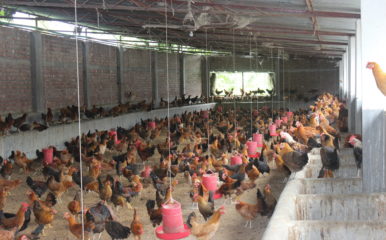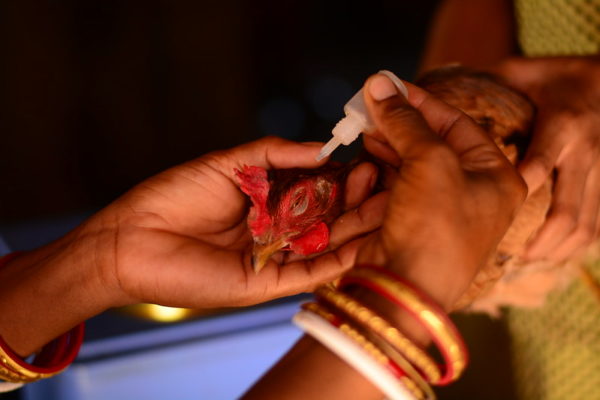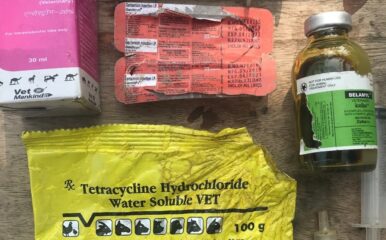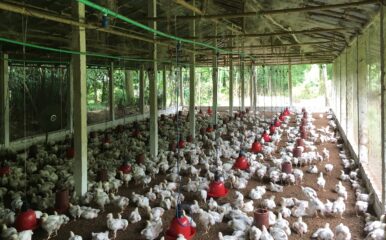
Poultry vaccine development and the importance of innovation
Published on 21/01/2021

GALVmed CC BY-NC-ND 2.0
With everyone’s attention directed towards the importance of vaccination in the control of COVID-19, it is interesting to reflect on the key role that vaccination plays within the One Health agenda and in veterinary medicine in particular. In no species is this more important than within those associated with the intensive poultry sector, where the high-density rearing of commercial birds requires good husbandry, welfare and biosecurity combined with effective disease control measures.
When developing new vaccines for poultry there are a number of important points to consider. The most significant of these is arguably the cost of the final product, since this will generally dictate the approach taken and uptake by the end-user.
The vaccine must of course be effective in protecting against morbidity (illness) and mortality (death), but it should also aim to improve productivity in layer and broiler birds, generally, measured by an increase in egg production or the feed conversion ratio (FCR), the latter being a measure of the efficiency with which the poultry convert animal feed into body mass.
In addition, the vaccines have to be convenient to use across a range of production systems, including allowing for the mass immunisation of birds in intensive production systems. Ideally, a single dose of vaccine should provide both a rapid and long-lasting immunity. Vaccines should offer broad host protection against various strains of a pathogen and they ought to be stable within a reliable cold chain for distribution. Finally, the vaccine will need to be targeted to the appropriate sector within the poultry industry, be it broiler, layer or breeder birds, as each has its specific husbandry requirements.
Research & development
The procedure for developing a new veterinary vaccine is split between research and development stages. The research stage can take up to five or more years to complete and is divided into the discovery and the feasibility or pre-development phases.
The development stage will generally take three to six years to complete using UK or European Union regulatory processes and this is divided into early-phase development, late-phase development and registration. Further details can be found at vaccinedevelopment.org.uk.
There are a number of key points that are important to keep in mind when developing a new poultry vaccine:
- You must develop a clear new product profile associated with a detailed project plan and timelines.
- You must keep diligent records of all reagents used within the development process and clearly describe the source of all materials used, ensuring that this is both safe and free from any extraneous agents.
- You should prepare pre-master and master seeds using strict protocols, and define the final manufacturing process ahead of any regulatory trials.
- When running the vaccine trials, you must ensure that you use the correct target birds and administration route(s) for the final vaccine.
- It is important to have early interactions with the regulators and always keep the end-user or customer in mind throughout the development process.
Innovation is particularly important in the development of poultry vaccines since this is likely to enable you to improve the safety, efficacy, delivery, convenience, stability and cost of the final product.
Many novel platform technologies often find their first application within veterinary medicine and this has been particularly notable for vector vaccines within poultry. Viral vectors are already widely used and they can now be delivered in ovo to provide simultaneous protection against three important diseases: Marek’s disease, infectious bursal disease and Newcastle disease).
In addition, attenuated bacterial vectors have recently been licensed for use against both salmonella and necrotic enteritis. Further developments are likely to arise from the use of attenuated Eimeria vaccines as vectors. These new technologies are often combined with improved mass vaccine delivery methods, novel formulations and greater stability.
In summary, poultry vaccines have a number of unique requirements, they must be carefully managed during their development and they often utilise innovative technologies.
Dr Michael Francis is Managing Director of BioVacc Consulting and a Board member of the International Veterinary Vaccinology Network (IVVN). He will be speaking in our next Roadmap Series event on Poultry production: vaccination challenges on Wednesday 3 February 2021.


